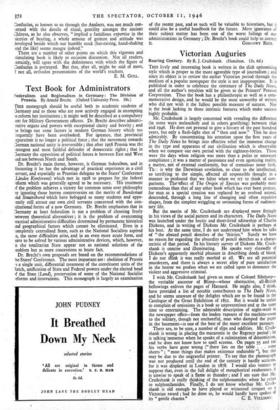Victorian Auguries
Roaring Century. By R. J. Cruikshank. (Hamilton. 12s. 6d.)
THIS lively and interesting book is written in the slick epitomising style which is proper to the more agreeable type of journalism ; and since its object is to review the earlier Victorian period through the medium of a Popular newspaper the style is not inappropriate. It is published in order to celebrate the centenary of The Daily News, and all the author's royalties will be given to the Printers' Pension Corporation. Thus the book has a philanthropic as well as a com- memorative design, and he would be the most unworthy of writers who did not wish it the fullest possible measure of success. Nor is the book lacking in those intrinsic features which make success highly probable.
Mr. Cruikshank is largely concerned with revealing the difference (in some ways melancholy and in others gratifying) between 1846 and 1946. He does not pretend to give a history of the past hundred years, but only a flash-light shot of "then and now." This he does admirably. By concentrating his attention upon the first years of The Daily News he brings into effective relief the immense change in the type and apparatus of our civilisation which is observable when we compare our own period with the eighteen-forties. Those were the days when religion was more than a polite or necessary compliance ; it was a matter of passionate and even agonising reality, a matter, not of external conformity, but of tremulous inner faith. Th: is why the Darwinian revelation, so clear to the intellectual, so terrifying to the simple, affected all responsible thought in a manner so profound that we falter when we try to think of com- parisons. The -effect of The Origin of Species was probably more tremendous than that of any other book which has ever been printeo, for man as a special creation was replaced by an evolved animal, descended, through a long line of changing and often repulsive shapes, from the simplest wriggling or swimming forms of rudimen- tary life.
But the merits of Mr. Cruikshank are displayed more fittingly in his views of the social pattern and its characters. The Daily News was launched under the hectic and short-lived editorship of Charles Dickens, and in writing of Dickens Mr. Cruikshank is perhaps at his best. At the same time, I do not understand him when he talks of "the absurd pencil sketches of the 'thirties." Surely we have no reason for regarding the absurdity of pencil sketches as a charac- teristic of that period. In his literary survey of Dickens Mr. Cruik- shank is concise and illuminating. He speaks very shrewdly of Dickens's apparently morbid pleasure in describing deeds of blood. I do not think it was really morbid at all. We are all potential murderers, and there is always a secret alloy of pure satisfaction in the horror we profess when we are called upon to denounce the violent and aggressive criminal.
wish Mr. Cruikshank had given us more of Colonel Sibthorp- the veritable ancestor of Blimp—whose obstructive, all-British bellowings enliven the pages of Hansard. He might also, I think, have provided a list of notable contributors to The Daily News, and he seems unaware of the delights which are to be found M the Catalogue of the Great Exhibition of 1851. But it would be unfair to complain of omissions in a book so unpretentious and at the same time so entertaining. The admirable description of night-work in the newspaper office—from the leaden vapours of the machine-room to the solitary, though not uncheerful, man who damped the paper in the basement—is one of the best of the many excellent passages.
There are, to be sure, a number of slips and oddities. Mr. Cruik- shank is wrong in placing the macaronis in the Regency period ; he is talking nonsense when he speaks of a culmination of determinism, and he does not know how to spell eczema. On pages 55 and ioo his verbs have gone wrong (" there lies on the table . . . some sheets" ; "most things that makes existence endurable "), but this may be due to the ungrateful printer. To say that the phonograph was not produced until the end of the century is hardly accurate, for it was displayed in London in 1878. I would also venture to suppose that, even in the full delight of metaphorical exuberance, it is unwise to speak of a flame as thunder ; and I am sure that Mr. Cruikshank is really thinking of the sulphonamides when he refers to sulphanilamides. Finally, I do not know whether Mr. Cruik- shank is old enough. to have played or witnessed croquet on a Victorian sward ; had he done so, he would hardly have spoken of






























 Previous page
Previous page